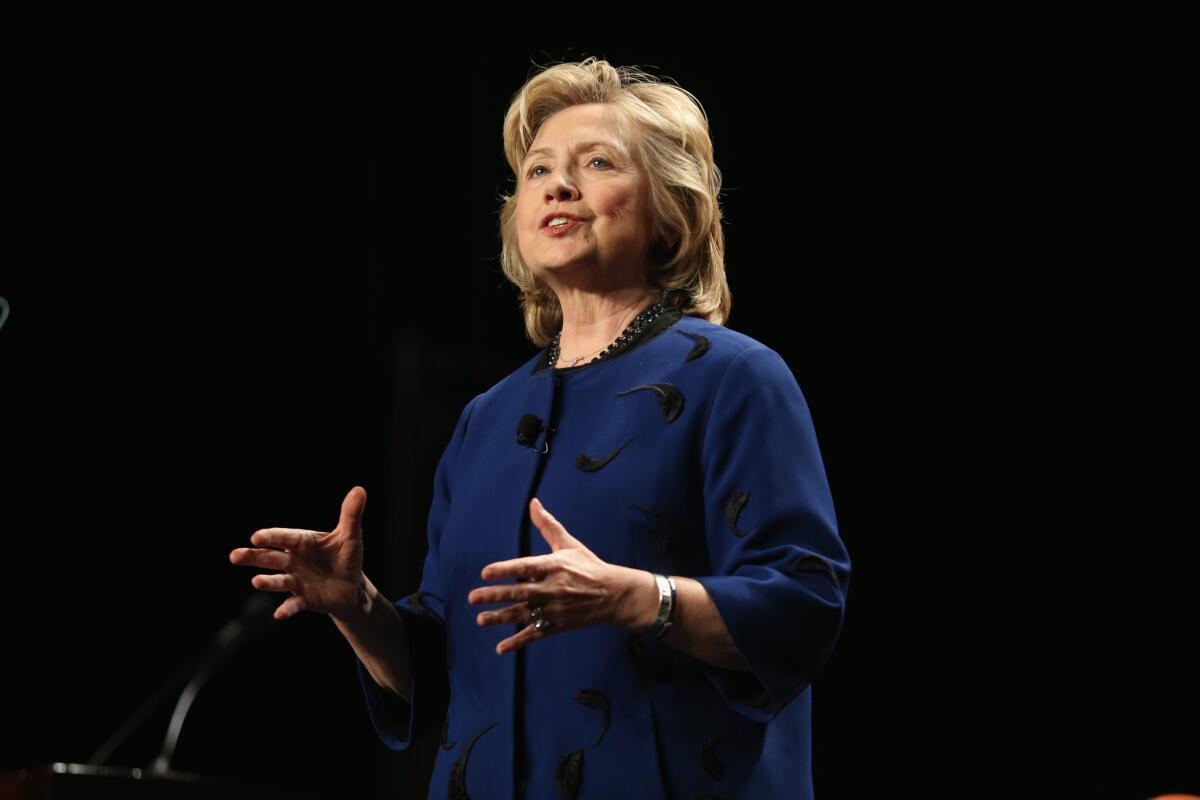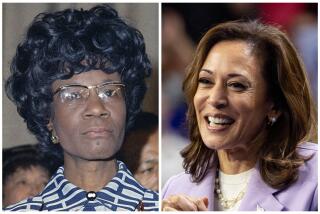Advice to Hillary Clinton: ‘be real,’ and ‘don’t be defensive’

- Share via
Through many years in the public eye, Hillary Clinton’s image has evolved from that of a sharp-edged campaigner, who in 1992 offended legions of women with her comments seeming to dismiss baking cookies, to the experienced stateswoman of today.
New memos released Friday from Hillary and Bill Clinton’s eight years in the White House chart the exhaustive work that went into crafting the first lady’s image — revealing the advice Clinton received and the debate among her aides about how to help her as she embarked on a controversial attempt to transform the nation’s healthcare system, as well as initiatives to draw attention to the rights of women and girls.
The most direct of the newly-released memos was a July 1999 missive from advisor Mandy Grunwald to Hillary Clinton as the first lady was preparing for a tour that would launch her 2000 bid to become the U.S. senator for New York. Grunwald advised Clinton to adopt a “chatty, intimate, informal” tone — keeping her public discussions conversational rather than raising her voice and turning her statements into a speech.
“Don’t be defensive. Look like you want the questions,” Grunwald wrote, warning that reporters would pounce on any answer that seemed testy. “Even on the annoying questions, give relaxed answers.”
Grunwald urged Clinton to “be real” and assume that New Yorkers knew little about her beyond her interest in healthcare, children and “then a lot of tabloid junk.”
“Look for opportunities for humor,” Grunwald wrote. “It’s important that people see more sides of you, and they often see you only in very stern situations.”
As Clinton prepared to move into her own political career, Grunwald argued that she should create distance from her husband rather than using “the administration’s record as your own.”
“You’ve spent a lot of years saying, ‘My husband did X.’ This trip is about you. And you are not an incumbent. If you want to talk about something like the (Children’s Health Insurance Program), talk about what you did,” the memo said.
The missives, circulated among the heavily-female cadre of Clinton’s top advisors, show early in the White House careful attention years to convincing reporters that Clinton was not locked down in a “bunker mentality,” and to fostering Clinton’s connection to American women as she spoke on women’s rights at events around the world.
As Clinton prepared for an appearance at the United Nations’ Fourth World Conference on Women in Beijing — an event that laid the groundwork for a Clinton Foundation initiative on women and girls that the former secretary of State spoke about a few weeks ago — Clinton aide Lisa Caputo stressed the importance of “bringing your trip to Beijing home” through listening sessions with working women and young women in the U.S.
Suggesting an interview with “CBS News” anchor Dan Rather upon Clinton’s return, Caputo noted that it would reinforce that women’s issues were “a serious story” and not “‘soft issues.’”
The documents released by the National Archives and the Clinton Library, which were sealed for more than 12 years under the Presidential Records Act, are filled with references to the first lady’s uncomfortable relationship with the national media.
In an August 1995 memo to top Clinton advisor Maggie Williams, Caputo noted that the first lady’s then-upcoming book tour could produce “good political mileage” because Clinton was comfortable with her subject. She also argued that Clinton should “own the women’s media,” and suggested monthly meetings with editors of women’s magazines, as well as appearances on morning news shows with large female audiences. Other ideas to boost Clinton’s image included a guest appearance on ABC’s “Home Improvement” that would place her in a “likeable light.”
Caputo also favored the time-tested strategy of targeting regional media and smaller newspapers around the country — a successful part of the Clinton campaign strategy in 1992: “Hillary is comfortable with the local reporters and enjoys speaking with them,” Caputo wrote. “This will help us get around her aversion to the national Washington media and serve to counter the tone of the national media.”
The first lady’s office also saw the celebration of historical events — like Eleanor Roosevelt’s birthday and an event celebrating women’s suffrage — as a chance to put Clinton’s own ambitions in context.
“It may help to round out her image,” Caputo wrote, “and make what she is doing seem less extreme or different in the eyes of the media.”
Twitter: @MaeveReston
More to Read
Get the L.A. Times Politics newsletter
Deeply reported insights into legislation, politics and policy from Sacramento, Washington and beyond. In your inbox three times per week.
You may occasionally receive promotional content from the Los Angeles Times.











